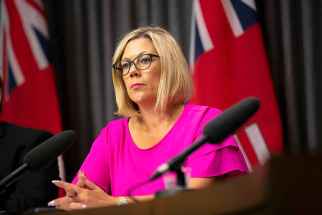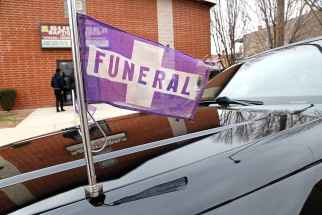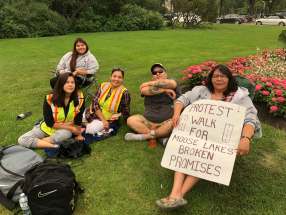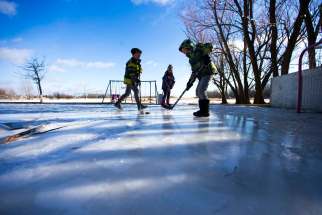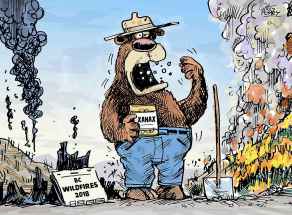Squires shifts blame for St. Boniface soil subterfuge Documents show province knew about contamination weeks earlier than previously announced
Read this article for free:
or
Already have an account? Log in here »
To continue reading, please subscribe:
Monthly Digital Subscription
$0 for the first 4 weeks*
- Enjoy unlimited reading on winnipegfreepress.com
- Read the E-Edition, our digital replica newspaper
- Access News Break, our award-winning app
- Play interactive puzzles
*No charge for 4 weeks then price increases to the regular rate of $19.00 plus GST every four weeks. Offer available to new and qualified returning subscribers only. Cancel any time.
Monthly Digital Subscription
$4.75/week*
- Enjoy unlimited reading on winnipegfreepress.com
- Read the E-Edition, our digital replica newspaper
- Access News Break, our award-winning app
- Play interactive puzzles
*Billed as $19 plus GST every four weeks. Cancel any time.
To continue reading, please subscribe:
Add Free Press access to your Brandon Sun subscription for only an additional
$1 for the first 4 weeks*
*Your next subscription payment will increase by $1.00 and you will be charged $16.99 plus GST for four weeks. After four weeks, your payment will increase to $23.99 plus GST every four weeks.
Read unlimited articles for free today:
or
Already have an account? Log in here »
Hey there, time traveller!
This article was published 20/08/2018 (2669 days ago), so information in it may no longer be current.
The provincial government withheld — for at least six weeks — test results that showed soil in South St. Boniface was contaminated with heavy metals, then misinformed media about when the lab results were in and why residents were kept in the dark.
Documents obtained by the Free Press through freedom of information requests on Sustainable Development Minister Rochelle Squires’ email account show the Manitoba government knew soil in the Winnipeg neighbourhood was contaminated with heavy metals — including lead — as early as June 4.
The area is home to many gardens where vegetables are grown. Soil samples taken from eight of those gardens came back with lead levels well beyond acceptable limits.
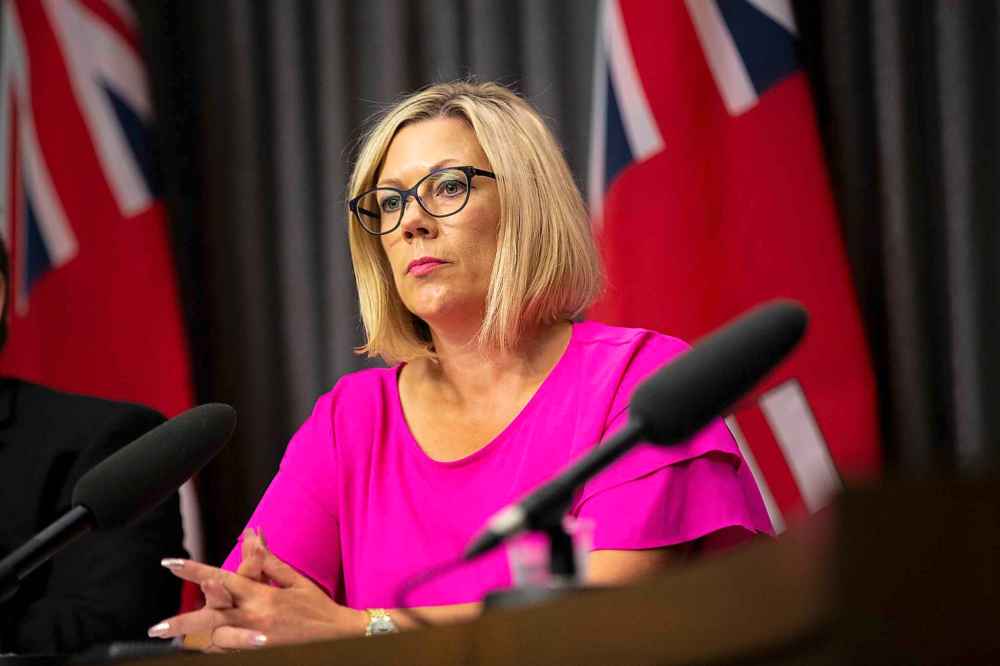
Lead is linked to developmental and neurological problems, and can lead to permanent and profound health defects. No amount of exposure is considered safe.
Instead of informing affected residents, as well as the wider neighbourhood and public, the provincial government failed to disclose the lab results for more than two weeks before Premier Brian Pallister called the St. Boniface byelection June 19. (The legislature seat became open after longtime NDP MLA Greg Selinger stepped down.)
When the heavy metal contamination was finally made public — the same day of the byelection on July 17 — Squires used the media blackout rules which govern provincial byelections as an excuse for why residents weren’t immediately notified.
She later said she was told by Crown counsel not to release the results until after the polls closed.
“It gave me great discomfort that I wasn’t able to go public the minute I found out about this and wasn’t able to hold a press conference and have full disclosure,” Squires told the Free Press at the time.
Residents whose properties tested positive for heavy metal contamination weren’t notified until July 13; the wider public wasn’t made aware of the results until July 17. Squires repeatedly said she’d first learned about the results one week to 10 days (July 3-6) before affected residents were informed.
But the documents obtained by the Free Press make clear that isn’t true. Squires, alongside sustainable development’s top brass, knew about the results much earlier than she repeatedly told the media.
On June 4, Sustainable Development director Don Labossiere wrote an advisory note, which also carries the name of acting assistant deputy minister Tracey Braun, laying out the results of the soil testing.
In an email briefing for an 11:30 a.m. meeting June 21 between Labossiere and Squires — which turned up in a freedom of information search of the minister’s inbox — the advisory notice is included as an attachment.
During a phone interview Monday, Squires walked back her past on-the-record comments about when she first learned about the lab results, saying she’d got the date wrong.

“I should have not ball-parked the date when I first learned about the results,” Squires said, referring to repeated comments she’d made to Free Press reporters.
“But what I can tell you is that I learned of the results on June 21. I had a meeting in my office with (Labossiere) who brought this to my attention. I do understand that he had written an advisory note dated June 4.”
Between June 4 and June 18, the lab results would have been available to be released both to affected residents and the public, since no byelection had been called.
During that time, however, Squires claims Labossiere and Braun failed to inform her about the results, despite a number of face-to-face meetings with Braun. When asked who — if anyone — the advisory note containing the lab results was given to, Squires said Monday she wasn’t sure.
“I don’t know if (the advisory note) was given to anybody between June 4 and June 21. I’m very disappointed that my assistant deputy minister did not bring this to my attention… That’s unacceptable and that is going to be reviewed,” Squires said.
She added she’s launching a formal review into the department’s reporting process to “ensure that timely and sensitive information is not in the department for two weeks before it gets to my office or my attention.”
Squires repeatedly side-stepped questions Monday on why she didn’t inform the public on July 17 her department had received the lab results as early as June 4.
Numerous area residents who spoke to the Free Press said the feeling in the neighbourhood is the provincial government doesn’t care about them, and this latest revelation adds more fuel to the fire.
“You don’t know what to think anymore. There’s a whole month’s difference there. You have to wonder why the information would be held back like that. It’s concerning, it’s disappointing,” a spokesperson for the South St. Boniface Residents Association said Monday.
“You can’t prove intent, but that’s a big delay, especially when you consider the potential harm. What are you supposed to think?”
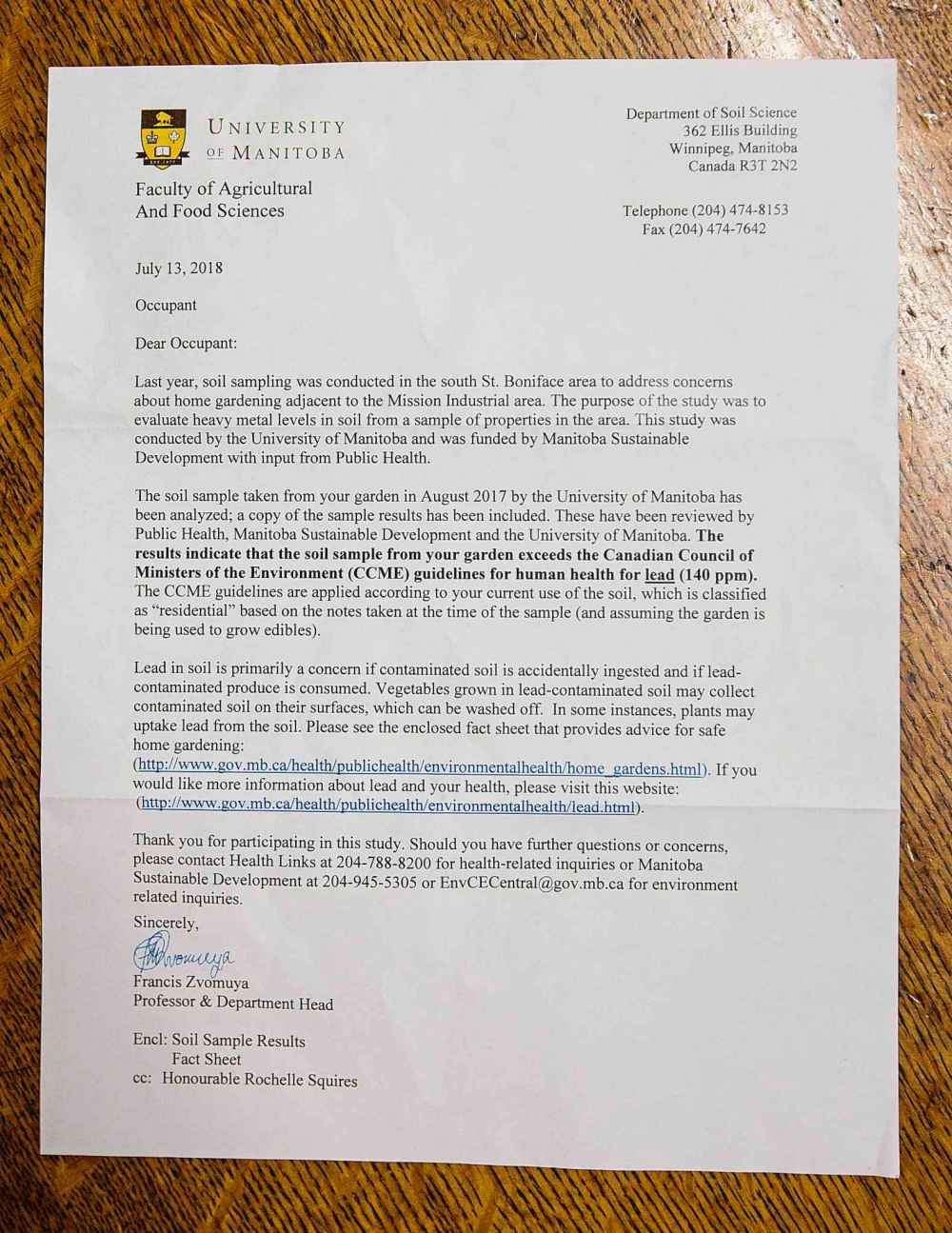
Another area resident who spoke to the Free Press, who asked not to be named, was more direct. She said she thinks the province withheld the results because it was concerned how the news would affect Conservative candidate Mamadou Ka’s chances in the byelection
When told about that resident’s comments, Squires dismissed them.
“There is absolutely no truth to that whatsoever… There was no way I could withhold something I wasn’t aware of,” she said.
A spokesman for Manitoba Sustainable Development did not respond to a request for comment.
ryan.thorpe@freepress.mb.ca
Twitter: @rk_thorpe
Timeline
Aug. 15, 2017 — Representatives from Sustainable Development, then-NDP MLA Greg Selinger, University of Manitoba associate Prof. Shirley Thompson, and area residents sit down to discuss potential soil contamination in South St. Boniface. Based on preliminary testing of three properties, Thompson said there was reason to believe there could be heavy metal contamination. Minister of Sustainable Development Rochelle Squires later said there was “no reason for concern,” but the province agrees to fund independent testing of soil samples.
Dec. 7, 2017 — Residents sit down with Squires and again express concerns about heavy metal contamination in their neighbourhood. It is the only face-to-face meeting residents have had with the minister.
Feb. 20, 2018 — Selinger announces his pending resignation from the Manitoba legislature.
March 7 — Selinger steps down from office, opening door to a pending byelection in the St. Boniface riding.
June 4 — Manitoba Sustainable Development becomes aware soil samples taken in the summer of 2017 have tested positive for heavy metal contamination. One sample comes back six times higher than the residential standard for lead levels.
June 19 — Tory Premier Brian Pallister calls the byelection for St. Boniface, with polls opening July 17.
June 21 — Squires and Sustainable Development director Don Labossiere have a face-to-face meeting where the lab results are discussed.
July 13 — The province sends letters to affected residents, telling them their properties have tested positive for heavy metal contamination.
July 17 — The St. Boniface byelection is held. News of the soil contamination breaks. Squires tells the Free Press she first learned seven to 10 days before affected residents were notified. She makes no mention of the fact her department became aware of the results in early June.
Aug. 20 — Squires admits she misinformed the press about when she was told about the lab results, now saying she was first informed June 21.

Ryan Thorpe likes the pace of daily news, the feeling of a broadsheet in his hands and the stress of never-ending deadlines hanging over his head.
Our newsroom depends on a growing audience of readers to power our journalism. If you are not a paid reader, please consider becoming a subscriber.
Our newsroom depends on its audience of readers to power our journalism. Thank you for your support.
History
Updated on Monday, August 20, 2018 7:04 PM CDT: adds deck
Updated on Monday, August 20, 2018 9:04 PM CDT: adds info about legal advice received by Squires





